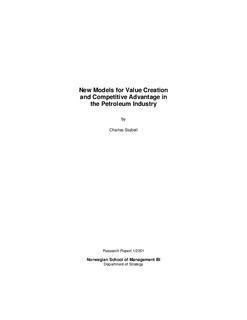New Models for Value Creation and Competitive Advantage in the Petroleum Industry
Research report

View/
Date
2001Metadata
Show full item recordCollections
- Research Reports [141]
Abstract
This research project has applied, tested and further developed a set of new models for the analysis of value creation and competitive advantage in the context of the global petroleum industry. The basic idea behind the project was that Porter’s value chain model (1985) for the analysis of firm-level competitive advantage was basically only applicable to manufacturing. Building on Thompson’s (1967) distinction between long-linked, intensive and mediating value creation technologies, we proposed three distinct generic value configurations for the analysis and management of firm-level value creation across industries and firms (see Stabell and Fjeldstad, 1998; Fjeldstad and Stabell, 1997). Each configuration has a distinct activity template and different drivers of firm performance. Thus, while the value chain is proposed as relevant to the analysis of manufacturing firms relying on a long-linked technology, the value shop is an activity template for firms that use an intensive technology and create value by resolving unique customer problems. The value network is an activity template for firms that use a mediating technology and that create value by enabling direct and indirect exchanges across a set of customers.
The major results of the work can be grouped into three main areas: further development of theories and methods, empirical studies, and impact on research, teaching and practice. While our empirical studies are focused on the petroleum industry (primarily petroleum exploration), the other categories of results span a much broader range of issues and industries.
Series
Research Report01/2001